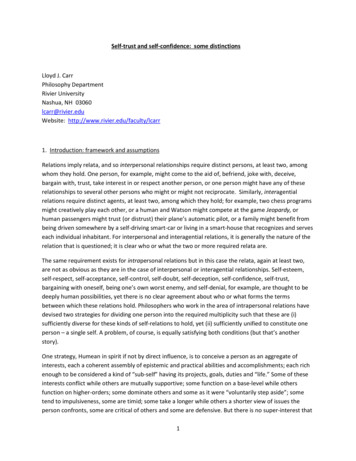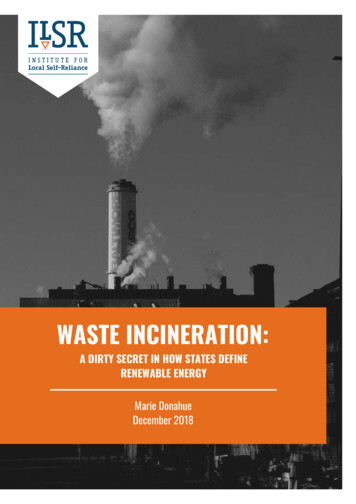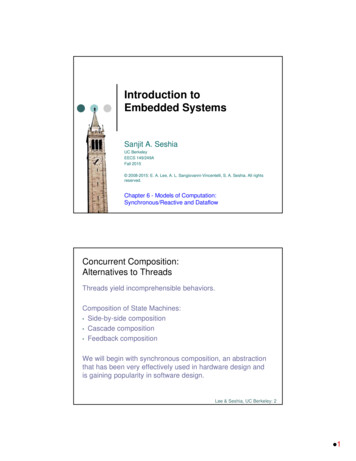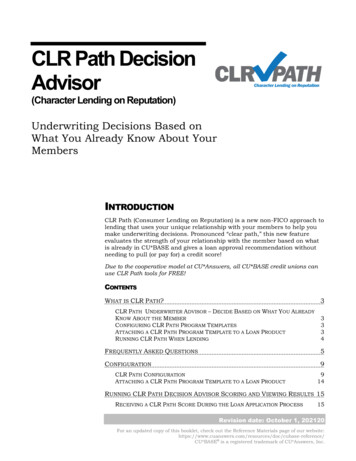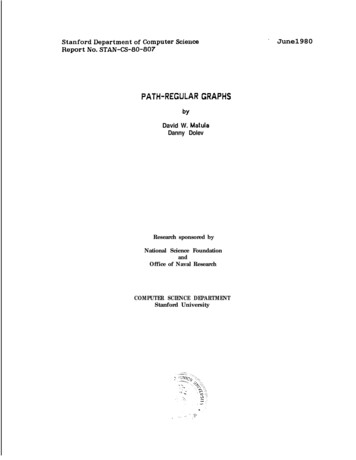
Transcription
My Path toSelf-Reliance
My Path to Self-RelianceDear Brothers and Sisters:The Lord has declared, “It is my purpose to provide for my saints”(D&C 104:15). This revelation is a promise from the Lord that Hewill provide temporal blessings and open the door of self-reliance,which is the ability for us to provide the necessities of life for ourselves and our family members.This booklet has been prepared to help members of the Churchlearn and put into practice principles of faith, education, hardwork, and trust in the Lord. Accepting and living these principleswill better enable you to receive the temporal blessings promisedby the Lord.We invite you to diligently study and apply these principlesand teach them to your family members. As you do so, your lifewill be blessed. You will learn how to act on your path towardgreater self-reliance. You will be blessed with greater hope,peace, and progress.Please be assured that you are a child of our Father in Heaven.He loves you and will never forsake you. He knows you and isready to extend to you the spiritual and temporal blessings ofself-reliance.Sincerely,The First PresidencyPublished by The Church of Jesus Christ of Latter-day SaintsSalt Lake City, Utah 2014, 2015 by Intellectual Reserve, Inc.All rights reserved.English approval: 3/152
My Path to Self-Reliance FACILITATOR INSTRUCTIONSMy Path to Self-Reliance helps members understand their level of self-reliance and create a planfor improvement. This booklet can be used with groups or individuals. For best results, follow thematerial exactly as written. Encourage all to participate, write in their booklets, and follow thetime recommendations. A My Path meeting should last about two hours.For large groups, set up the room with tables for separate groups of three to seven people.Learning comes through small group discussions and the guidance of the Holy Ghost during thepersonal “Ponder” sections. “Discuss” and “Ponder” sections should last about three minuteseach. For “Read” sections, ask someone to read aloud to the group.Encourage spouses to complete this booklet together. If possible, have the participants completethe self-assessment (pages 4 and 5) prior to the meeting. For each My Path meeting, please fillout a survey at srs.lds.org/report. For more guidance, watch the video “How to Use My Path” atsrs.lds.org/videos.WHAT ARE THE BLESSINGS OF SELF-RELIANCE?Watch:15 minutesWatch the video “I Will Provide for My Saints,” available atsrs.lds.org/videos. (No video? Just continue reading.)Practice:Read the letter from the First Presidency on page 2 and underlinethe promised blessings.Discuss:Discuss the following with two or three other people: What doesthe First Presidency say you must do to qualify for each of thepromises you underlined?Ponder:Take three minutes to quietly ponder the following:Why does Heavenly Father want me to become self-reliant? As Ibecome more self-reliant, how am I becoming like Him?Read:Discuss:Read Doctrine and Covenants 29:34 (on the right).What do you learn from this scripture about going to school,getting a job, or starting a business? Why is it so important tounderstand this truth?THE SAVIOR WILL HELP ME BECOMESELF-RELIANTPonder:Read:“All things unto me arespiritual, and not atany time have I givenunto you a law whichwas temporal.”DOCTRINE ANDCOVENANTS 29:3410 minutesWhat challenges are keeping me from providing for myself andmy family? Write your thoughts here:Read Matthew 28:18 (on the right).The Savior has the power to help us become self-reliant. As weexercise faith in Him, He can do miracles. He can make moreout of our efforts than we can do ourselves. Doing the exercisesin this booklet is our first step toward greater self-reliance.“And Jesus came andspake unto them, saying, All power is givenunto me in heavenand in earth.”MATTHEW 28:183
My Path to Self-RelianceSELF-RELIANCE ASSESSMENTPractice:20 minutesThis activity helps you measure your temporal and spiritual self-reliance. Be honest inyour responses. If you do not know your expenses for step 1, just make your bestestimate. Ask for help if needed. You may move to a more private location to completethis exercise if you would like to.STEP 1STEP 2HOW MUCH DO I SPEND?HOW SELF-RELIANT AM I TODAY?Write how much you spend monthly oneach item below.EXAMPLE: Food300EXAMPLE: We have enough food to eat.Tithes, offeringsWe pay our tithing and fast offerings.SavingsWe spend less than we earn; we save money.FoodWe have enough food to eat.HousingWe are protected and safe in our home.WaterWe have enough clean water to drink and use.Medical expensesWe can get medical care when we need it.TransportationWe have transportation when we need it.Educational expensesOur children attend school.Debt paymentsWe are free of consumer debt.ClothingWe have clean, modest clothes.Electricity/fuelWe have enough light and fuel.Other:We believe the Lord will provide for our needs.Other:We feel and follow the promptings of the Holy Ghost.Total monthly expensesCurrent monthly incomeYou may not know all of your current expenses.Discuss your expenses with your spouse or family.Start tracking them if you are not already. You will usethis information later in two group meetings.4Mark where you and your family are now.We study the scriptures daily.We pray daily.We take the sacrament weekly.We are worthy of a temple recommend.We sacrifice to serve others.
My Path to Self-Reliance Self-reliance is the “ability, commitment, and effort to provide the spiritual andtemporal necessities of life for self and family” (Handbook 2: Administering theChurch [2010], 6.1.1).STEP 3HOW MUCH DO I NEEDTO BE SELF-RELIANT?We become self-reliant when we can answer “always”to the statements in step 2. Estimate what you wouldneed to spend each month to answer ysEducational expensesNeverSometimesOftenAlwaysDebt esOftenAlways EXAMPLE: Food700Tithes, offeringsSavingsFoodHousingWaterMedical expensesOther:Total self-reliance expensesMy self-reliant income goalPonder what it would be like if you could answer“always” to all of these statements. As you track yourcurrent expenses, try to learn more about what it will costto answer “always.”A local mentormay contact youlater to help youwith the assessment exercise orwith your path toself-reliance.5
My Path to Self-RelianceHOW CAN I INCREASE MY SPIRITUALSELF-RELIANCE? 10 minutesPonder:Read Doctrine and Covenants 88:63 and Mosiah 18:10(on the right).What one or two things can you change in your life to drawcloser to the Lord and have the Holy Ghost with you?Practice:In the box below, write a specific goal for what you would liketo change.“Draw near unto meand I will draw nearunto you.”DOCTRINE ANDCOVENANTS 88:63“Keep his commandments, that he maypour out his Spiritmore abundantlyupon you.”MOSIATH 18:10My spiritual goal:To work on my goal,this week I will:WHAT ARE MY STRENGTHS?Ponder:Read:15 minutesWrite your self-reliant income goal (from page 5) in the box tothe right. Do you have the necessary work skills to earn thatincome?Read Doctrine and Covenants 46:11–12 (on the right).We all have different talents. For example, some people aregood at sales, and some are good at making things. Some peopleare good at working with others, while other people prefer towork alone.Practice:Think about your own talents. What are you good at? Whatexperiences and strengths do you have? The table on page 7 hassome examples. Circle all of the experiences and strengths thatapply to you, and write more in the blank spaces.My self-reliant income goal:“For all have notevery gift givenunto them; forthere are many gifts,and to every manis given a gift bythe Spirit of God.To some is givenone, and to some isgiven another, thatall may be profitedthereby.”DOCTRINE ANDCOVENANTS 46:11–126
My Path to Self-Reliance EXPERIENCESSTRENGTHS(Circle some and write more)(Circle some and write more)Church callingsConstructionHonestPhysically strongWorthy of templerecommendMissionComputersFaith in Jesus Farming/gardeningEnglish speakerPatientMechanical skillsChild careFood preparationGood listenerDependableConstruction skillsSalesClothing/craftsKind to othersCreativeCleaning skillsMaintenance/repairHealth careGood characterFast learnerSales skillsTransportationTeachingTeam builderGood teacherProblem solverEducation/certificateHouseholdmanagementGood writerCommunicatorDetail-orientedServing othersOwning a businessOrganizerMath skillsInitiativeRead:Practice:The Lord knows us better than we know ourselves. It is important that we learn what strengths He has given us. We do thispartly by asking Him in prayer. We can also study our patriarchal blessings and ask friends and family what strengths theyrecognize in us.Get with one or two other people. Share an experience of whenyou have accomplished something meaningful. Ask them totell you what strengths they think you used to accomplish thattask. Did they see a strength that you did not think about?After the others tell you about your strengths, write what youfeel are your top strengths.MY TOP SPIRITUAL AND TEMPORAL STRENGTHS7
My Path to Self-RelianceWHAT WORK COULD GIVE ME THE INCOMEI NEED? 10 minutesPractice:Write your self-reliant income goal (from page 5) and yourspiritual goal (from page 6) again in the boxes to the right.Read:As we discuss jobs and self-employment options, keep in mindyour self-reliant income goal. Some jobs pay more than others;think about which options would help you earn your selfreliant income.Discuss:Discuss with the group the best-paying work, the work mostin demand, and the work with the best future where you live.Consider how these opportunities will impact your family andChurch service. Some examples are listed in the box below.(These may not all be good options in your area.)JOBSSELF-EMPLOYMENTHotel maintenanceComputer repairFood salesConstructionCleaningStreet vendingAuto cleaningTransportationAuto repairConstructionPlumbingEntertainmentHealth careTransportationHair care ComputersProduct salesNursingClothing gBookkeepingFarmingEducationBicycle repairRaising animalsStreet vendingCustomer serviceAccountingPractice:List two or three jobs or businesses from the options youdiscussed that could provide your self-reliant income. Consideroptions that match your strengths and experiences or those thatcould match later, after you receive training.MY TOP WORK OPTIONS1.2.3.8My self-reliant income goal:My spiritual goal:
My Path to Self-Reliance Read:One of the best ways to learn about the jobs you’re interested inis to talk to people who do that work.Discuss:Do you or anyone in the group know someone that does thework you are interested in? Write their names below andarrange to meet them.Practice:Circle the questions you would like to ask these people: How did you decide to go into this type of work? What are the best parts and worst parts of your job? What kind of training, education, or work experience isrequired to get started in this work? What range of income could be expected for someonestarting in this job? Could I follow you for a day to learn about your work? Do you know anyone else I could talk to about this work?This week, talk to at least three people to learn more about thework you are interested in. Write three things you learned:Discuss:Practice:You may not be qualified yet to get your chosen job or to startthe business you want. As a group, discuss the schools andtraining in your area that would help you qualify to do thework that will provide your self-reliant income goal.List some training or education opportunities that you think aregood options and that you would like to learn more about.“As a people werightfully place highpriority on secularlearning and vocational development. Wewant and we mustexcel in scholarshipand craftsmanship. Icommend you forstriving diligently togain an education andbecome an expert inyour field. I invite youto also become experts in the doctrinesof the gospel—especially the doctrine ofthe priesthood.”DIETER F. UCHTDORF,“Your Potential, Your Privilege,” Ensign or Liahona,May 2011, 59MY TOP TRAINING OR EDUCATION OPTIONS1.2.3.9
MyPath to Self-RelianceWHAT IS A SELF-RELIANCE GROUP?Read:5 minutesOnce you decide on the type of work that will help you becomeself-reliant, the next step is to join a self-reliance group. A self-reliancegroup focuses on one of three topics: starting and growing a business,finding a good job, or getting needed education.Self-reliance groups are different from most Church classes, lessons, andworkshops. There are no teachers or trainers; instead, group memberslearn together, encourage one another to act and keep commitments,and counsel together to solve problems. Groups meet 12 times forabout two hours each meeting; it’s important to attend regularly and beon time. Acting on commitments can take one to two hours per day.In each group, participants also learn spiritual self-relianceskills using the booklet My Foundation: Principles, Skills, Habits.They practice habits that will help them become strongerspiritually and temporally.WHAT GROUPS ARE AVAILABLE?5 minutesStarting and Growing My BusinessStartingand GrowingMy BusinessSELF-RELIANCEFor those who have a business or want to start one. Groupmembers practice record keeping, marketing, and cashmanage ment. They also test ways to increase their incomethrough small business experiments.My Job SearchMy JobSearchSELF-RELIANCEFor those who have the skills to get a good job. Groupmembers get a job by identifying opportunities, networking,presenting themselves professionally, and preparing for jobinterviews.Education for Better WorkEducation forBetter WorkSELF-RELIANCEFor those who need education or training to get a good jobor start a business. Group members identify work that willhelp them become self-reliant. They find a school or program that leads to that work (such as Pathway—see page 11).Participating in this group results in a school plan and a PEFloan appli cation (if needed).Note: These workbooks are not available in all languages.Other self-reliance resources may be available in your area.10
My Path to Self-Reliance WHICH SELF-RELIANCE GROUP SHOULD I JOIN?10 minutesPonder:Take three minutes by yourself to ponder and pray for guidanceabout which group can help you on your path to self-reliance.Practice:Everyone will now split up into the groups they have chosen.If you are completing My Path during a devotional,stand and move to the group you have chosen. (Theremay be multiple groups of each kind. Your self-reliancespecialist will guide you.)Discuss:Discuss the day, time, and location of your group meetings.Write this information in the box to the right. If you are completing My Path alone, contact your self-reliance resource centerfor group meeting times.Day:Time:Location:NEXT STEPSI will discuss my self-reliance assessment with my spouse or other familymembers (see pages 4–5).I will work on my spiritual self-reliance goal.I will start tracking my expenses.I will talk to three people about the work I am considering.I will join and attend a self-reliance group.“I would desire thatye should consideron the blessed andhappy state of thosethat keep the commandments of God.For behold, they areblessed in all things,both temporal andspiritual.”MOSIAH 2:41PATHWAYPathway is a low-cost educational opportunity offered inpartner ship with BYU–Idaho. Available in most areas, theprogram combines online courses with local gatherings.Pathway students earn college credit while improving theirEnglish proficiency, spirituality, and marketable skills—including money management, math, and more. The programtakes one year to complete (a basic level of English is requiredto start). To learn more, contact your stake self-reliancespecialist or visit pathway.lds.org.11
My Path to Self-RelianceWeek 3Self-AssessmentsUse the following pages later in your self-reliance group.HOW SELF-RELIANT AM I NOW?Fill out the following assessment during your sixth self-reliance group meeting.STEP 1STEP 2HOW MUCH DO I SPEND?HOW SELF-RELIANT AM I TODAY?Write how much you spend monthly oneach item below.EXAMPLE: Food300Mark where you and your family are now.EXAMPLE: We have enough food to eat.Tithes, offeringsWe pay our tithing and fast offerings.SavingsWe spend less than we earn; we save money.FoodWe have enough food to eat.HousingWe are protected and safe in our home.WaterWe have enough clean water to drink and use.Medical expensesWe can get medical care when we need it.TransportationWe have transportation when we need it.Educational expensesOur children attend school.Debt paymentsWe are free of consumer debt.ClothingWe have clean, modest clothes.Electricity/fuelWe have enough light and fuel.Other:We believe the Lord will provide for our needs.Other:We feel and follow the promptings of the Holy Ghost.Total monthly expensesCurrent monthly incomeWe study the scriptures daily.We pray daily.We take the sacrament weekly.We are worthy of a temple recommend.We sacrifice to serve others.12
Self-reliance is the “ability, commitment, and effort to provide the spiritual andtemporal necessities of life for self and family” (Handbook 2: Administering theChurch [2010], 6.1.1).STEP 3HOW MUCH DO I NEEDTO BE SELF-RELIANT?We become self-reliant when we can answer “always”to the statements in step 2. Estimate what you wouldneed to spend each month to answer esOftenAlwaysNeverSometimesOftenAlways EXAMPLE: Food700Tithes, offeringsSavingsFoodHousingWaterMedical expensesTransportationEducational expensesDebt paymentsClothingElectricity/fuelOther:Other:“Get out of debtand stay out ofdebt.”SPENCER W. KIMBALL,Teachings ofPresidents of theChurch: Spencer W.Kimball (2006),115Total self-reliance expensesMy self-reliant income goalPonder what it would be like if you could answer“always” to all of these statements. As you track yourcurrent expenses, try to learn more about what it will costto answer “always.”13
My Path to Self-RelianceHOW SELF-RELIANT AM I NOW?Fill out the following assessment during your 12th self-reliance group meeting.STEP 1STEP 2HOW MUCH DO I SPEND?HOW SELF-RELIANT AM I TODAY?Write how much you spend monthly oneach item below.EXAMPLE: Food300Mark where you and your family are now.EXAMPLE: We have enough food to eat.Tithes, offeringsWe pay our tithing and fast offerings.SavingsWe spend less than we earn; we save money.FoodWe have enough food to eat.HousingWe are protected and safe in our home.WaterWe have enough clean water to drink and use.Medical expensesWe can get medical care when we need it.TransportationWe have transportation when we need it.Educational expensesOur children attend school.Debt paymentsWe are free of consumer debt.ClothingWe have clean, modest clothes.Electricity/fuelWe have enough light and fuel.Other:We believe the Lord will provide for our needs.Other:We feel and follow the promptings of the Holy Ghost.Total monthly expensesCurrent monthly incomeWe study the scriptures daily.We pray daily.We take the sacrament weekly.We are worthy of a temple recommend.We sacrifice to serve others.14
My Path to Self-Reliance Self-reliance is the “ability, commitment, and effort to provide the spiritual andtemporal necessities of life for self and family” (Handbook 2: Administering theChurch [2010], 6.1.1).STEP 3HOW MUCH DO I NEEDTO BE SELF-RELIANT?We become self-reliant when we can answer “always”to the statements in step 2. Estimate what you wouldneed to spend each month to answer esOftenAlwaysNeverSometimesOftenAlways EXAMPLE: Food700Tithes, offeringsSavingsFoodHousingWaterMedical expensesTransportationEducational expensesDebt paymentsClothingElectricity/fuelOther:Other:Total self-reliance expenses“Get out of debtand stay out ofdebt.”SPENCER W. KIMBALL,Teachings ofPresidents of theChurch: Spencer W.Kimball (2006),115My self-reliant income goalPonder what it would be like if you could answer“always” to all of these statements. As you track yourcurrent expenses, try to learn more about what it will costto answer “always.”15
MY PATH TOSELF-RELIANCESelf-reliance is “the ability, commitment, and effort to providethe spiritual and temporal necessities of life for self and family”( Handbook 2, 6.1.1).1. ASSESS MY NEEDSSet my self-reliant income goal and spiritual goals.2. CHOOSE MY PATHDecide how I will become self-reliant.3. JOIN A GROUPDevelop spiritual habits and practical skills in 90 days: Start and grow a business, Find a better job, or Identify needed skills and create an education plan.4. CONTINUE TO ACT Keep working to become self-reliant. Serve others and help them progress.“And it is my purpose to provide for my saints.”Doctrine and Covenants 104:15
Aug 26, 2015 · The Savior has the power to help us become self-reliant. As we exercise faith in Him, He can do miracles. He can make more out of our efforts than we can do ourselves. Doing the exercises in this booklet is our first step toward greater self-reliance. FACILITATOR INSTRUCTIONS My Path to Self-Reliance helps me



